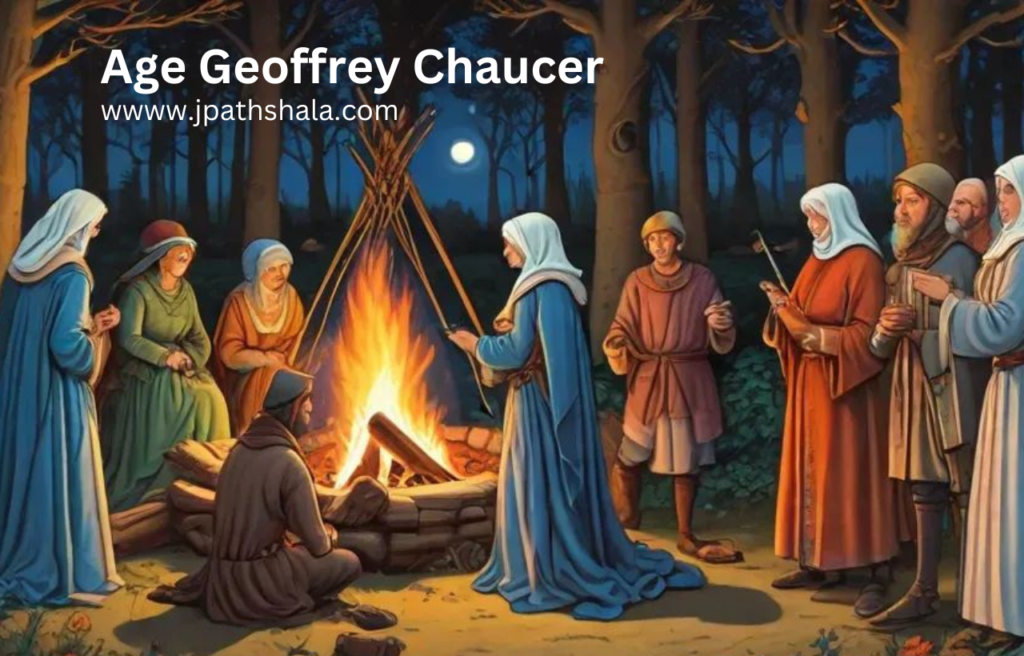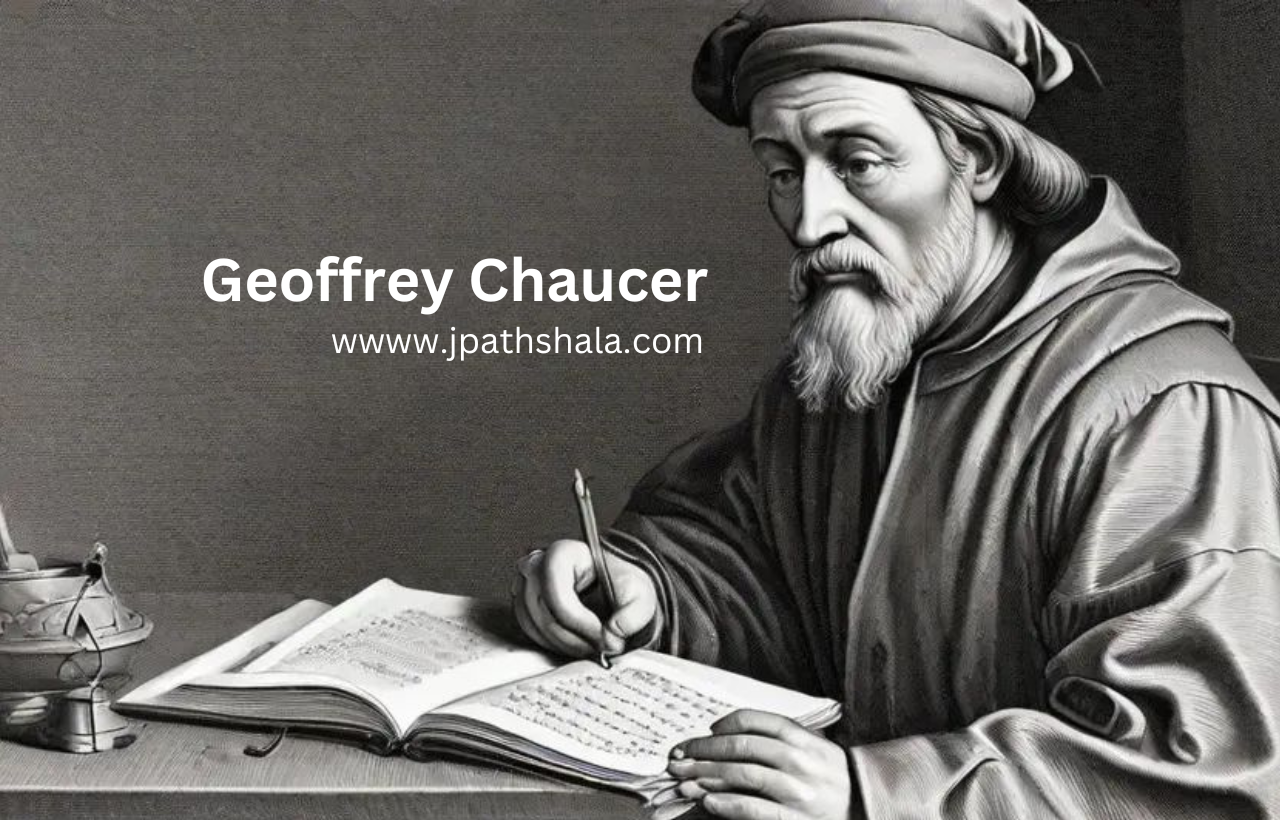The age of Chaucer was an age of transition period that brought many changes in political, economic, social, and religious conditions during the 14th century or the age of Chaucer.
Age of Chaucer: Political Condition

The Hundred Years’ War (1337- 1453): Historically the age of Chaucer was one of the most turbulent periods in British history. It witnessed a long succession of conflicts between France and England, which are collectively known as the Hundred Years’ War. During the reign of Edward III, England won glorious victories in the Battle of Caen in 1346 and Poitiers’s battle in 1356. This gave her self-confidence and fanned the patriotism of her people. Most of the English conquests were achieved by knights and nobles, but the most important part was played by the humble bowmen. The lowly arches well supported the aristocracy and rubbed shoulder with a shoulder on the battlefield. It struck at the power and privilege of the aristocracy. It brought a note of democracy to society and washed off the age-old barrier between the upper and the middle class. It resulted in the ascendancy of the middle classes in national life.
Age of Chaucer: Social Condition
The black death (1346-1353) and the Peasants’ Revolt (1381): Chaucer’s age was an age of discontent and unrest. The Hundred Years War, no doubt, made England a united nation and a colonial power, but it also imposed unheard-of hardship upon the people. The prolonged conflict resulted in an increased burden for the people and pleasantry groaned under the heels of crushing taxation. The matters were made worse by the Great Plague known as the Black Death (1346-1353), which swept over England when Chaucer was only nine years old. It decimated the population of England. It is estimated that about half of the people died within no time.
Labour was scarce, there was no demand, and prices of agricultural products fell rapidly. The price of labour rose, and the price of bread fell. Efforts were made to control wages by legislation. Wage earners tried to evade legislation by migrating to distant corners of the country. The result was instability, indiscipline, and lawlessness. The discontent of the people was universal. While people were starving and wallowing in deplorable misery, the king and his courtiers were leading a life of gaiety and luxury. The extravagance and corruption of the king and his court were fully explained by War Tyler, Jack Straw, and John & Ball, under whose leadership the people rose in open revolt against the king and his tyranny. The peasant revolt of 1381 burst like a volcano and shook the very foundation of English society.
Rise of Modern Spirit: The Decay of Feudalism: The peasant revolt did much to weaken the feudal system and to give self-confidence to the people. Agriculture no longer remained profitable, and this marked the beginning of the end of the Feudal systems. This revolt was suppressed by the courage and good judgment of the boy king Richard II exerted a lasting influence on the temper of the lower classes. People were asserting their right to free thought and independent judgment.
In other words, the democratic spirit was growing. Now a dissatisfied serf could buy his freedom and pay money rent for his farm. Many of the peasants kept sheep, and by the sale of the sheep’s wool could amass coins enough to buy their freedom. A serf could become a freeman by establishing a legal residence in a town. Men who could do better on their land than in working for the lord of the manor, purchased their freedom, while others offered themselves wholly for hire. Thus the peasant’s revolt succeeded to a great extent, in its purpose. The serfs no longer remained slaves tied to their barons and their strips. This resulted in the gradual weakening of the Feudal System. The authority of the king was weakened while that of the Parliament grew apace.
Condition of women: Women were considered inferior to men. Most of the women of the lower society were illiterate. Women of aristocratic families enjoyed pelf and power only by marriage. Child marriage was also in vogue among wealthy persons. Dowry was in practice and girls were often sold. Changes also came in men’s dresses they became fond of jewels and preferred jewels in their outfits. Both men and women of fashion wore enormous headdresses of fantastic scale like horns, turbans, and towers.
Age of Chaucer: Religious condition
Corruption in the Church: the Lollard movement– In the age of Chaucer the church became a place of corruption, profligacy, and materialism. Most of the clergymen, instead of devoting their time and energy to religious meditation, had given themselves up to wine, wealth, and women. The monk, the Friar, the Pardoner, and the summoner had given up their religious life of piety and holiness and brought information into the church. The dissatisfaction of the people with this state of affairs was intense and several spirited souls could not but raise their voices against this sorry state of affairs John Wycliff the ‘morning star of Reformation and poets like Langland and Gower freely denounced the growing corruption in the church and through their teaching sought to revive the real Christianity. Wycliffe’s followers, known as Lollards, went about the country, preaching his ideals. That was called the Lillard movement and it shook the prestige and power of the Pope. They also lost their power to elect the members of the church.
Economical condition
Trade and commerce: The age of Chaucer witnessed the rise of prosperous merchants and
tradesmen. They carried out splendid business with European countries and were laying the foundation of England’s industrial prosperity. Small traders and handicraftsmen grew into power and began to behave like aldermen and well-to-do citizens. The importance and self-consciousness of the smaller tradesmen and handicraftsmen increased with that of the great merchants. Thus this new and prosperous merchant class weakened the Feudal system as foreign trade and power were passed into its hands from the Feudal Lords.
Thus the age of Chaucer is a singularly Modern age. It is an age of intense social, political, religious, and literary activity. It is the meeting ground of the medieval and the modern, the Renaissance and the reformation, the old and the new, and the religious and the secular. In short, it is a remarkable age, an age in which men like Chaucercan make their mark.
